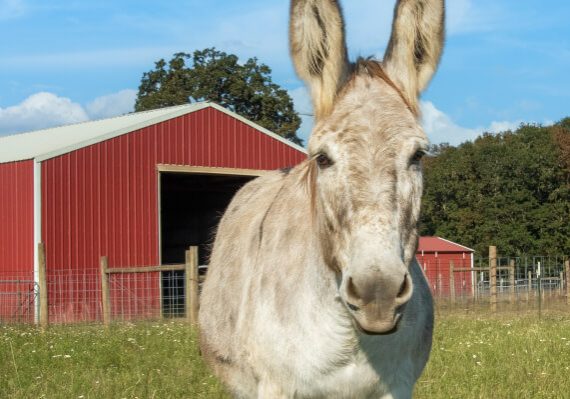Frequently Asked Questions
We do not allow "drop-in's" under any circumstances. As an all-volunteer non profit that cares for over 300 rescued animals, we cannot accommodate unscheduled visits. We offer Spring and Summer tours for groups of 5 or more for $20 per person (NOTE: Tours are currently done for 2024. Check back next spring!).
You can also sign up to our newsletter for updates on events at the sanctuary including monthly volunteer work days which are a good way to help out and see the sanctuary.
As an all-volunteer non profit, we are truly community run and are always in need of volunteers to help take care of the animals! If you'd like to volunteer, please fill out the application here. We currently ask that anyone interested in volunteering can commit to at least 2 (two) four hour shifts a month.
As much as we would love to be able to help every single animal in need, we are unable to accommodate surrenders. We encourage everyone to take responsibility for their companion animals and care for them to the best of their ability. If you believe that you are in a unique situation or there is an animal emergency, please contact us.
Sadly, we get hundreds of requests to take in roosters every year and simply do not have the resources to take all of them. Please be mindful of buying chicks at the feed store, especially if you live in an area where roosters are not allowed. Also, please be aware that there is an inherent cruelty associated with buying chicks at the feed store - for instance, hatcheries ship male chicks as packing material. When we buy chicks, we are directly and financially supporting hatcheries who are responsible for a whole host of staggeringly cruel practices. Roosters are amazing individuals and when given the chance to live, they make beautiful and funny companions.
We are so grateful that you care about animals! We commend you for wanting to help. Animals have very few, if any, legal rights in the United States, so when an animal is in danger or being abused it can be very frustrating trying to help. Here is a quick action list that you can do right now to help an animal in need:
1. Your first step should be to locate the person who is responsible for caring for the animal and communicating with them in a calm and respectful way to try to improve the animals situation.
2. Also contact the local animal control shelter.
3. Make sure to document as much as possible. Take photos and videos of the situtation (please be careful if you are documenting cruelty on a farm- many states have ag-gag laws which could cause you to get in trouble with the law.)
4. If the person responsible for the animal and animal control are unable (or unwilling) to help, you can contact ASPCA. This is where it will be helpful to have as much photographic evidence as possible.
5. If the animal is given to you, and is a farmed animal, please reach out to us and we will assist you in finding a suitable home for them.

